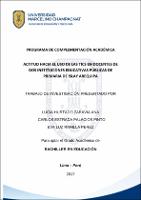Mostrar el registro sencillo del ítem
Actitud hacia el uso de las Tics en docentes de dos Instituciones Educativas Públicas de Primaria de Islay Arequipa
| dc.contributor.advisor | Arteaga Barrera, Martín Angel | |
| dc.contributor.author | Zaravia Ana, Lucia Hurtado | |
| dc.contributor.author | Palacios Pinto, Carlos Estrada | |
| dc.contributor.author | Ranilla Perez, Eva Luz | |
| dc.date.accessioned | 2017-11-29T16:08:50Z | |
| dc.date.available | 2017-11-29T16:08:50Z | |
| dc.date.issued | 2017 | |
| dc.identifier.uri | https://hdl.handle.net/20.500.14231/356 | |
| dc.description.abstract | La presente investigación monográfica nos da a conocer los principales lineamientos teóricos que debe tener los docentes hacia el uso de las nuevas tecnologías de la información y comunicación, el nuevo perfil que debe de tener frente al uso pedagógico y la importancia de las TIC en la educación del siglo XXI. Se hace también un análisis reflexivo de los antecedentes en relación al uso de las tecnologías en educación El desarrollo de las competencias que se tiene por alcanzar con respecto a las TIC gira en torno a tres componentes como son: el componente afectivo a través del cual el individuo manifiesta sentimientos de aceptación, gusto, rechazo o ansiedad hacia el objeto de actitud; el componente cognitivo constituido por creencias, conocimientos, opiniones, sentimientos y otros, relativo al objeto de actitud y el componente conductual basado en los actos de conducta que presenta un individuo. | es_ES |
| dc.description.abstract | The present monographic research gives us the main theoretical guidelines that teachers should have towards the use of new information and communication technologies, the new profile that must have against the pedagogical use and the importance of ICT in education of the 21st century. There is also a reflective analysis of the background in relation to the use of technologies in education The development of the competences that have to be achieved with respect to ICT revolves around three components such as: the affective component through which the individual manifests feelings of acceptance, taste, rejection or anxiety toward the object of attitude; the cognitive component constituted by beliefs, knowledge, opinions, feelings and others, relative to the object of attitude and the behavioral component based on the acts of behavior that an individual present. | en_US |
| dc.description.uri | Trabajo de investigacion | es_ES |
| dc.format | application/pdf | es_ES |
| dc.language.iso | spa | es_ES |
| dc.publisher | Universidad Marcelino Champagnat | es_ES |
| dc.rights | info:eu-repo/semantics/restrictedAccess | es_ES |
| dc.rights.uri | http://creativecommons.org/licenses/by-nc-nd/2.5/pe/ | es_ES |
| dc.source | Repositorio institucional - UMCH | es_ES |
| dc.source | Universidad Marcelino Champagnat | es_ES |
| dc.subject | Lineamientos teóricos | es_ES |
| dc.subject | Tics | es_ES |
| dc.subject | Competencias | es_ES |
| dc.title | Actitud hacia el uso de las Tics en docentes de dos Instituciones Educativas Públicas de Primaria de Islay Arequipa | es_ES |
| dc.type | info:eu-repo/semantics/bachelorThesis | es_ES |
| thesis.degree.name | Bachiller en Educación | es_ES |
| thesis.degree.grantor | Universidad Marcelino Champagnat. Facultad de Educación y Psicología | es_ES |
| thesis.degree.level | Bachiller | es_ES |
| thesis.degree.discipline | Educación | es_ES |
| thesis.degree.program | Complementación Académica | es_ES |
Ficheros en el ítem
Este ítem aparece en la(s) siguiente(s) colección(ones)
-
Educación [211]


